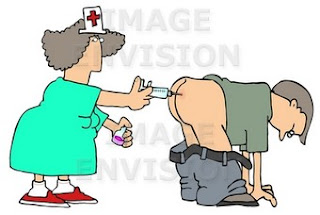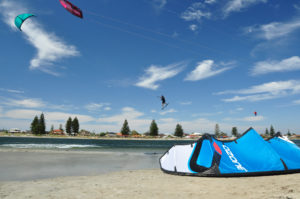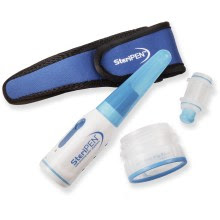Travel Vaccines, Meds, and Risks
RTW: 2007-2008, Travel Tips, Trip Planning, World - other travel posts — By Kelly on May 13, 2008 6:26 PM Yes, having a half dozen needles jabbed into your arm isn’t fun, but I hear that typhoid, rabies, and hepatitis can be inconvenient and painful as well.
Yes, having a half dozen needles jabbed into your arm isn’t fun, but I hear that typhoid, rabies, and hepatitis can be inconvenient and painful as well.
To avoid such travel complications, I began my research into the appropriate vaccinations prior to leaving the states. I started my Hepatitis immunizations, got a polio booster and tetanus shot in San Francisco. I decided to wait to get any additional immunizations until I knew more specifics as to where I would be traveling.
I visited The Travel Doctor in Sydney and shared with him my travel plans through Southeast Asia. I will be visiting Thailand, Cambodia, Laos, Vietnam, Philippines, Malaysia, Singapore, and Indonesia. Based on the countries I will be visiting and the length of time in each area, the doctor recommended I get a vaccination for Typhoid, Hepatitis A, and suggested that I consider a rabies vaccine as well. The rabies vaccine is suggested for much of Southeast Asia; however, only 50% of people opt for getting the vaccination due to the high cost. If bitten by a rabid animal, one will have to seek medical attention within 48 hours and begin a series of 5 shots. If one develops rabies they will die. I plan to do some cycling while in SE Asia and knowing how dogs like to chase moving objects, I decided I better be safe than sorry. If anyone were likely to get bitten by a rabid animal, it would probably be me!
Below is a summary of the shots I received and their costs:
Travel Doc Consultation Fee: $60.00
Hepatitis A:
Shot 1: $58.00 USD
Shot 2: $80.00 AUD (6-12 months after 1st injection)
Tetanus/Whooping Cough: was covered by my insurance in San Francisco
Polio Booster: was covered by my insurance in San Francisco
Influenza (Southern Hemisphere): $25 AUD
Typhoid: $55.00 AUD
Rabies:
Shot 1: $115.00 AUD
Shot 2: $115.00 AUD (given 7 days after 1st injection)
Shot 3: $115.00 AUD (given 21-28 days after 1st injection)
It was also highly suggested that I take Malaria medication while traveling through many parts of Laos and Cambodia. Malaria is a mosquito born disease caused by a parasite. There are four different anti-malaria medications on the market, each having different side effects, dosages, and cost. I had heard alot about the drug, Mefloquine, which has been known to cause hallucinations, depression, vivid dreams, and even seizures. My doc in San Francisco advised me against this drug. Of the other 3 drug options (Doxycycline, Malarone, and Chloroquine) I opted for Doxycycline which requires more doses; however, the medication is significantly cheaper than all of the other options at $1 a pill. I purchased a 12-week supply, as you have to start taking the medication two weeks prior to entering the risk area, each day you are in a risk area, and two weeks after you have left the risk area.
Dengue Fever is a mosquito-transmitted viral disease. Unlike malaria mosquitoes, which bite from dusk to dawn, dengue fever mosquitoes are most active during daytime hours. There are no medications that can be taken to prevent the disease, the best prevention is to avoid mosquito bites.
To prevent insect bites:
• Wear long sleeves and long pants
• Apply insect repellent to exposed skin every 4-6 hours
• It is important to use an insect repellent that contains 20-35% DEET.
• If using sunscreen apply sunscreen first, wait 20 minutes, then apply insect repellent.
• If the windows in your accommodations do not have screens on them, sleep under a bed net.
MEDICATIONS
Anti-Malaria Drug (Doxycycloe): $1.00 AUD/ pill; 12 weeks supply = $84.00
I also purchased a Travel/Medical kit, which is equipped with an assortment of antibiotics and other medications that will prepare me for just about any ailment.
TRAVEL MEDICAL KIT: $120.00
• Antibiotics: Noroxin (for travelers diarrhea); Simplotan (for Giardia) Rulide: (chest sinus, skin
infections); Cephalexin (for bacterial infections); Ciroflaxacin (for bacterial infections)
• Betadine: liquid antiseptic
• Neosporin: antiseptic
• Avomine: antihistamine
• Throat lozenges
• Laxatives
• Immodium: because foreign bacteria can be a real pain!
• Pepto Bismol: to prevent tummy aches when eating strange foods
• Gastrolyte: minimizes dehydration
• Panadol: pain killer
• Soframycin: eye/ear infection
• Stemzine: nausea, vomiting
• Tylenol sinus: decongestant
• Triamcinolone: corticosteroid ointment for skin conditions
Another major health concern while traveling is safe drinking water. I purchased a Steripen, a portable water purifier that uses ultraviolet light to destroy waterborne microbes. In the event that I cannot buy bottled water, I can use the SteriPEN to ensure that all my drinking water is safe.
Other food and water safety precautions:
• Avoid salads and uncooked vegetables
• Avoid drinks containing ice
• When purchasing bottled water, check that the cap is properly sealed. Vendors have been known to sell bottles of tap water in disguise.
A few things I have learned:
• Check out the CDC website to learn up to date information regarding suggested vaccinations and travel risks in foreign countries.
• Be sure your routine vaccinations are up-to-date. My mom had to dig up all my medical records from childhood. Routine vaccinations are those such as for influenza, chickenpox, polio, measles/mumps/rubella (MMR), and diphtheria/pertussis/tetanus (DPT).
• See a health care provider at least 4-6 weeks prior to your trip to allow time for your vaccines to take effect and to start taking medicine to prevent malaria, if you need it.
• Shop around for the cheapest options and check with your insurance companies to see what they will cover.
• Don’t get all your shots in one sitting, your arms will thank you and you reduce your chances of side effects.
• Be sure to keep your shots records on you when traveling abroad, but leave copies in a safe place at home. It’s as valuable as your passport for entry into many countries.
I know all of the above risks can sound a little scary, but if you educate yourself and minimize your risks in each region, take necessary precautions, and use common sense… you can travel anywhere and hopefully have an amazing time with as few complications as possible!
Tags: travel planning, travel tips













0 Comments
You can be the first one to leave a comment.